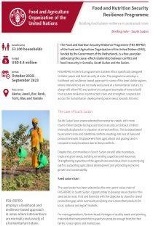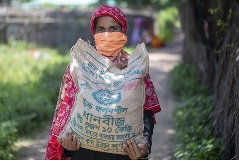Publications

Special Fund for Emergency and Rehabilitation Activities (SFERA): Annual Report 2021
07/2022
This annual report provides a brief description of the major operations initiated with the Special Fund for Emergency and Rehabilitation Activities (SFERA) for the 12-month period ending 31 December 2021. The report contains financial data for this period, as well as data since the Fund became operational.

Drought in the Horn of Africa: Revised rapid response and mitigation plan to avert a humanitarian catastrophe (January–December 2022)
06/2022
The Horn of Africa is facing the third severe La Niña‑induced drought episode in a decade, and the region is on the verge of a catastrophe if humanitarian assistance is not urgently scaled up and sustained.
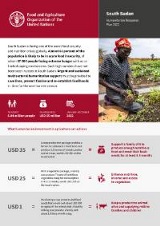
South Sudan: Humanitarian Response Plan 2022
06/2022
South Sudan is facing one of the worst food security and nutrition crises globally. Almost 63 percent of the population is likely to be in acute food insecurity, of whom 87 000 people facing extreme hunger with no or limited coping mechanisms.
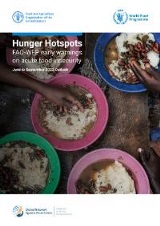
Hunger Hotspots: FAO-WFP early warnings on acute food insecurity: June to September 2022 Outlook
06/2022
The Food and Agriculture Organization of the United Nations (FAO) and the World Food Programme (WFP) warn that acute food insecurity is likely to deteriorate further in 20 countries or situations (including two regional clusters) – called hunger hotspots – during the outlook period from June to September 2022.
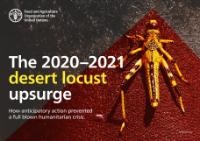
The 2020–2021 desert locust upsurge: How anticipatory action prevented a full blown humanitarian crisis
05/2022
In late 2019, a massive outbreak of desert locusts swept across the greater Horn of Africa and Yemen. This infographic outlines the actions FAO and partners took to avert a disaster, and showcases the impacts and results of the early, scaled up action.
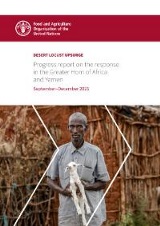
Desert locust upsurge: Progress report on the response in the Greater Horn of Africa and Yemen, September–December 2021
05/2022
This sixth and final progress report details FAO’s work to mitigate the effects of the desert locust upsurge – an unprecedented threat to food security and livelihoods – across the Greater Horn of Africa and Yemen between September and December 2021, while outlining the outcomes of the response in all of 2021.
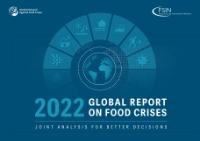
2022 Global Report on Food Crises: Joint analysis for better decisions
04/2022
The 2022 Global Report on Food Crises (GRFC 2022) highlights the alarming deterioration of acute food insecurity in 2021

Food and nutrition security resilience programme in Somaliland: Baseline report
11/2021
This report acts as a baseline for the Food and Nutrition Security Resilience Programme (FNS-REPRO) of the Food and Agriculture Organization of the United Nations (FAO), a four-year programme of USD 28 million funded by the Government of the Netherlands.
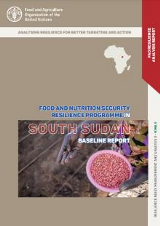
The Food and Nutrition Security Resilience Programme in South Sudan: Baseline report
09/2021
This report acts as a baseline for the Food and Nutrition Security Resilience Programme (FNS-REPRO) of the Food and Agriculture Organization of the United Nations (FAO), a four-year programme of USD 28 million funded by the Government of the Netherlands.

Greater Horn of Africa and Yemen: Desert locust crisis appeal, January 2020–December 2021
07/2021
The worst desert locust outbreak in decades is underway in the Greater Horn of Africa and Yemen, where tens of thousands of hectares of cropland and pasture have been damaged in Djibouti, Eritrea, Ethiopia, Kenya, Somalia, South Sudan, the Sudan, Uganda, the United Republic of Tanzania and Yemen, with potentially severe consequences for agriculture-based livelihoods in contexts where food security is already fragile.
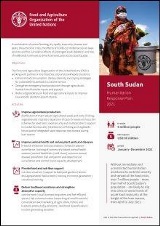
South Sudan: Humanitarian Response Plan 2021
03/2021
A combination of severe flooding, dry spells, insecurity, disease and pests, the economic crisis, the effects of COVID-19, limited access to basic services and the cumulative effects of prolonged asset depletion and loss of livelihoods continues to drive food insecurity across South Sudan.
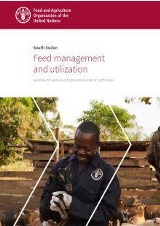
South Sudan: Feed management and utilization guidelines for pastoral and agropastoral areas
01/2021
The Food and Agriculture Organization of the United Nations (FAO) developed these guidelines with the overall objective to protect and improve the productivity of the ruminant livestock species of South Sudan.
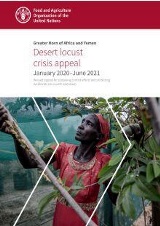
Greater Horn of Africa and Yemen: Desert locust crisis appeal January 2020 – June 2021
12/2020
The document is the revised version of the previously published Desert locust crisis appeal, providing an update and expansion of FAO's funding requirements for rapid response and sustained actions in the Greater Horn of Africa and Yemen to address the ongoing crisis.
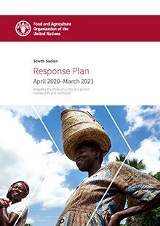
South Sudan: Response Plan, April 2020–March 2021
07/2020
Years of conflict, chronic vulnerabilities and weak essential services have deteriorated the food security and livelihood situation in South Sudan. Now, the COVID-19 outbreak threatens to paralyze an already fragile food system and negatively impact more than 6.5 million people who remain vulnerable.
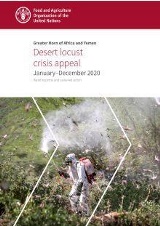
Greater Horn of Africa and Yemen: Desert locust crisis appeal (January–December 2020)
05/2020
The worst desert locust outbreak in decades is underway in the Greater Horn of Africa and Yemen, where tens of thousands of hectares of cropland and pasture have been damaged in Djibouti, Eritrea, Ethiopia, Kenya, Somalia, South Sudan, the Sudan, Uganda, the United Republic of Tanzania and Yemen, with potentially severe consequences for agriculture-based livelihoods in contexts where food security is already fragile.
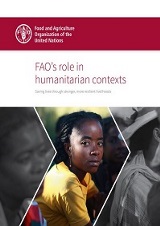
FAO's role in humanitarian contexts: Saving lives through stronger, more resilient livelihoods - Revised version
04/2020
The number of people experiencing hunger – both chronic and acute – has been persistently high in recent years.
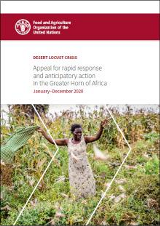
Desert Locust crisis: Appeal for rapid response and anticipatory action in the Greater Horn of Africa January–December 2020
02/2020
The worst desert locust outbreak in decades is underway in the Greater Horn of Africa, where tens of thousands of hectares of cropland and pasture have been damaged in Djibouti, Eritrea, Ethiopia, Kenya, Somalia, South Sudan, Uganda and the United Republic of Tanzania, with potentially severe consequences for agriculture-based livelihoods in contexts where food security is already fragile.

